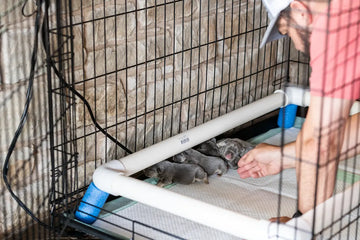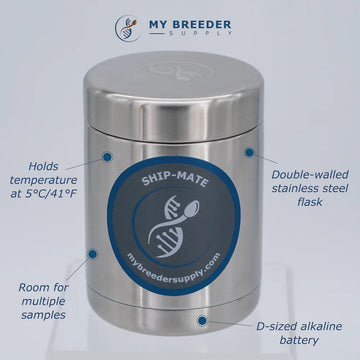
Starting a dog breeding program can be an immensely rewarding endeavor. It allows you to contribute to the betterment of specific dog breeds while pursuing your passion for canines.
However, it's a journey that requires careful planning, knowledge, and dedication.
In this comprehensive guide, we'll take you through the steps of initiating and maintaining a successful dog breeding program.
The Purpose of Dog Breeding Programs

Dog breeding programs serve several purposes, all geared toward the improvement and preservation of specific breeds:
Breed Preservation
Many breeding programs focus on preserving rare or endangered breeds, ensuring they continue to exist and thrive.
Trait Enhancement
Breeders may aim to enhance specific traits within a breed, such as temperament, size, or coat color.
Show and Performance
Some breeding programs are dedicated to producing dogs that excel in dog shows, sports, or working roles.
Selecting the Right Breed
Choosing the right breed is the first critical decision when starting a dog breeding program.
Define Your Goals
Begin by identifying your breeding goals. Are you interested in preserving a heritage breed, improving a particular trait, or breeding show-quality dogs?
Research Extensively
Thoroughly research the breed you're interested in. Understand their history, temperament, health considerations, and the breed standard set by kennel clubs.
Legal Considerations
Ensure you are compliant with all local and national regulations regarding dog breeding and ownership.
Creating the Ideal Breeding Environment
Providing a comfortable and safe environment for your dogs is essential for their well-being and successful breeding.
Environmental Conditions
Control factors like temperature, humidity, and lighting in your breeding facility to create the ideal conditions for your dogs.
Housing and Enclosures
Construct appropriate housing and enclosures that offer comfort and safety. Ensure they have ample space to move and rest.
Selecting and Acquiring Breeding Stock

The quality of your breeding stock significantly impacts the success of your program.
Traits and Genetics
Identify the specific traits you wish to enhance or maintain within the breed. Understand the genetics involved in those traits.
Health and Genetic Screening
Prior to acquiring breeding dogs, conduct thorough health assessments and genetic screenings to ensure they are free from hereditary conditions and diseases.
Sourcing Stock
Acquire your initial breeding dogs from reputable breeders or breed clubs. Avoid purchasing dogs from puppy mills or unreliable sources.
Breeding Techniques
Understanding and applying different breeding techniques is crucial in dog breeding.
Natural Breeding
Allow your dogs to mate naturally, closely observing their behavior and reproductive cycles.
Artificial Insemination
In some cases, artificial insemination may be necessary or advantageous. This technique involves manually introducing semen into the female.
Pregnancy and Whelping Care

Be prepared to provide attentive care to expectant mothers, ensuring their comfort and monitoring their health closely during pregnancy and whelping.
Puppy Rearing and Socialization
Caring for puppies and ensuring they grow up well-adjusted is an integral part of dog breeding.
Neonatal Care
Provide specialized care for newborn puppies, including proper nutrition and temperature control.
Weaning
Gradually transition puppies to solid food during the weaning process.
Socialization
Expose puppies to various experiences, people, and environments to ensure they grow up confident and well-socialized.
Genetic Management
Maintaining genetic diversity and health within the breed is essential.
Inbreeding and Outbreeding
Balance inbreeding and outbreeding to avoid genetic problems while preserving breed characteristics.
Pedigree Tracking
Keep meticulous records of your dogs' pedigrees to make informed breeding decisions.
Genetic Diversity
Occasionally introduce new bloodlines to maintain genetic diversity within the breed.
Health and Disease Management
Preventive measures and prompt action are crucial for maintaining a healthy breeding stock.
Preventive Measures
Implement vaccination schedules, quarantine protocols, and regular health check-ups to prevent disease outbreaks.
Recognizing and Treating Illness
Develop the ability to recognize signs of illness and have a plan for prompt treatment.
Quarantine Protocols
Quarantine new dogs before introducing them to your breeding stock to prevent the spread of diseases.
Record Keeping
Detailed record-keeping is crucial for tracking the progress of your breeding program.
Maintain Accurate Records
Keep detailed records of breeding dates, health assessments, lineage, and any noteworthy observations.
Breeding and Whelping Logs
Log all breeding attempts and whelping events, whether successful or not.
Health Records
Document health-related information, including vaccinations and treatments.
Marketing and Sales
If your breeding program involves selling puppies, effective marketing is crucial.
Identify Your Market
Determine your target audience, whether it's families looking for pets, show enthusiasts, or working dog owners.
Ethical Sales Practices
Screen potential buyers to ensure they can provide responsible and loving homes for your puppies.
Building a Reputation
Build a reputation for the quality and ethical standards of your breeding program. Positive reviews and word-of-mouth referrals are invaluable.
Continuous Learning
Stay updated and adaptable in the dynamic field of dog breeding.
Staying Updated
Continuously educate yourself about the latest developments in dog breeding, including health practices, genetics, and breeding techniques.
Networking
Connect with other experienced breeders, join breed clubs, and attend dog shows and seminars to stay informed and share knowledge.
Adapting to Changes
Be prepared to adapt your breeding program based on new information, changing breed standards, or shifts in market demand.
Starting a dog breeding program is an exciting and fulfilling journey, but it demands careful planning, continuous learning, and a genuine love for dogs.
Whether you aim to preserve a rare breed or produce exceptional show dogs, responsible breeding can be deeply rewarding. It allows you to contribute positively to the breed's well-being and legacy.
FAQs on Starting a Dog Breeding Program
How do I determine if a specific breed is suitable for breeding?
Before selecting a breed for breeding, consider your goals, experience, and resources.
Research the breed thoroughly, paying attention to its health issues, temperament, and breed standard. It's also advisable to consult with experienced breeders or breed clubs for insights.
What are the ethical considerations in dog breeding?
Ethical breeding involves prioritizing the health and well-being of the dogs. Avoid practices that prioritize profit over the dogs' welfare, such as overbreeding or breeding dogs with known hereditary health issues.
Responsible breeding also includes screening potential puppy buyers and ensuring they provide loving and suitable homes.
How can I prevent inbreeding in my breeding program?
To prevent inbreeding, maintain thorough pedigree records, and carefully plan each breeding pair. Avoid breeding close relatives, and periodically introduce new bloodlines into your program. Consulting with a canine geneticist can provide valuable insights into maintaining genetic diversity.
What is the role of health testing in dog breeding?
Health testing is crucial in identifying and mitigating hereditary health issues within a breed. Conduct health screenings for common breed-specific conditions, such as hip dysplasia or eye diseases. Only breed dogs with clean bills of health to improve the overall well-being of the breed.
How can I market and sell puppies responsibly?
Responsible marketing and sales involve thoroughly screening potential buyers to ensure they are prepared for the responsibilities of dog ownership. Be transparent about the puppies' health, vaccination status, and lineage.
Avoid selling puppies through pet stores or online platforms that may not prioritize the welfare of the animals.




